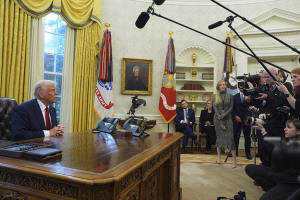Trump says tariffs on Canada and Mexico coming Saturday, and he's
deciding whether to tax their oil
 Send a link to a friend
Send a link to a friend
 [January 31, 2025] By
JOSH BOAK [January 31, 2025] By
JOSH BOAK
WASHINGTON (AP) — President Donald Trump said his 25% tariffs on Canada
and Mexico are coming on Saturday, but he’s still considering whether to
include oil from those countries as part of his import taxes.
“We may or may not,” Trump told reporters Thursday in the Oval Office
about tariffing oil from Canada and Mexico. “We’re going to make that
determination probably tonight.”
Trump said his decision will be based on whether the price of oil
charged by the two trading partners is fair, although the basis of his
threatened tariffs pertains to stopping illegal immigration and the
smuggling of chemicals used for fentanyl.
The risk of tariffs on Canadian and Mexican oil could undermine Trump's
repeated pledge to lower overall inflation by reducing energy costs.
Costs associated with tariffs could be passed along to consumers in the
form of higher gasoline prices — an issue that Trump placed at the
center of his Republican presidential campaign as he vowed to halve
energy costs within one year.
“One year from Jan. 20, we will have your energy prices cut in half all
over the country,” Trump said at a 2024 town hall in Pennsylvania.
AP VoteCast, an extensive survey of the electorate, found that 80% of
voters identified gas prices as a concern. Trump won nearly 6 in 10
voters who said they worried about prices at the pump.

The United States imported almost 4.6 million barrels of oil daily from
Canada in October and 563,000 barrels from Mexico, according to the
Energy Information Administration. U.S. daily production during that
month averaged nearly 13.5 million barrels a day.
Matthew Holmes, executive vice president and chief of public policy at
the Canadian Chamber of Commerce, said Trump's tariffs would “tax
America first” in the form of higher costs.
“This is a lose-lose,” Holmes said. "We will keep working with partners
to show President Trump and Americans that this doesn’t make life any
more affordable. It makes life more expensive and sends our integrated
businesses scrambling.”
But Trump showed no concerns that import taxes on the United States'
trading partners would have a negative impact on the U.S. economy,
despite the risk shown in many economic analyses of higher prices.
[to top of second column] |

President Donald Trump talks with reporters as he signs executive
orders in the Oval Office at the White House, Thursday, Jan. 30,
2025, in Washington. (AP Photo/Evan Vucci)
 “We don’t need the products that
they have," Trump said. "We have all the oil you need. We have all
the trees you need, meaning the lumber.”
The president also said that China would pay tariffs for its
exporting of the chemicals used to make fentanyl. He has previously
stated a 10% tariff that would be on top of other import taxes
charged on products from China.
Oil prices were trading at roughly $73 a barrel on Thursday
afternoon. Prices spiked in June 2022 under President Joe Biden to
more than $120 per barrel, a period that overlapped with overall
inflation hitting a four-decade high that fueled a broader sense of
public dissatisfaction with the Democratic administration.
Gas prices are averaging $3.12 a gallon across the United States,
roughly the same price as a year ago, according to AAA.
Later on Thursday, Trump threatened more tariffs against countries
looking at alternatives to the U.S. dollar as a means of global
exchange.
The president previously made the same threat in November against
the so-called BRICS group, which includes Brazil, Russia, India,
China, South Africa, Egypt, Ethiopia, Iran and the United Arab
Emirates.
Russian President Vladimir Putin has suggested that sanctions
against his country and others mean that nations need to develop a
substitute for the dollar.
“We are going to require a commitment from these seemingly hostile
Countries that they will neither create a new BRICS Currency, nor
back any other Currency to replace the mighty U.S. Dollar or, they
will face 100% Tariffs, and should expect to say goodbye to selling
into the wonderful U.S. Economy,” Trump posted on social media.
All contents © copyright 2025 Associated Press. All rights reserved
 |